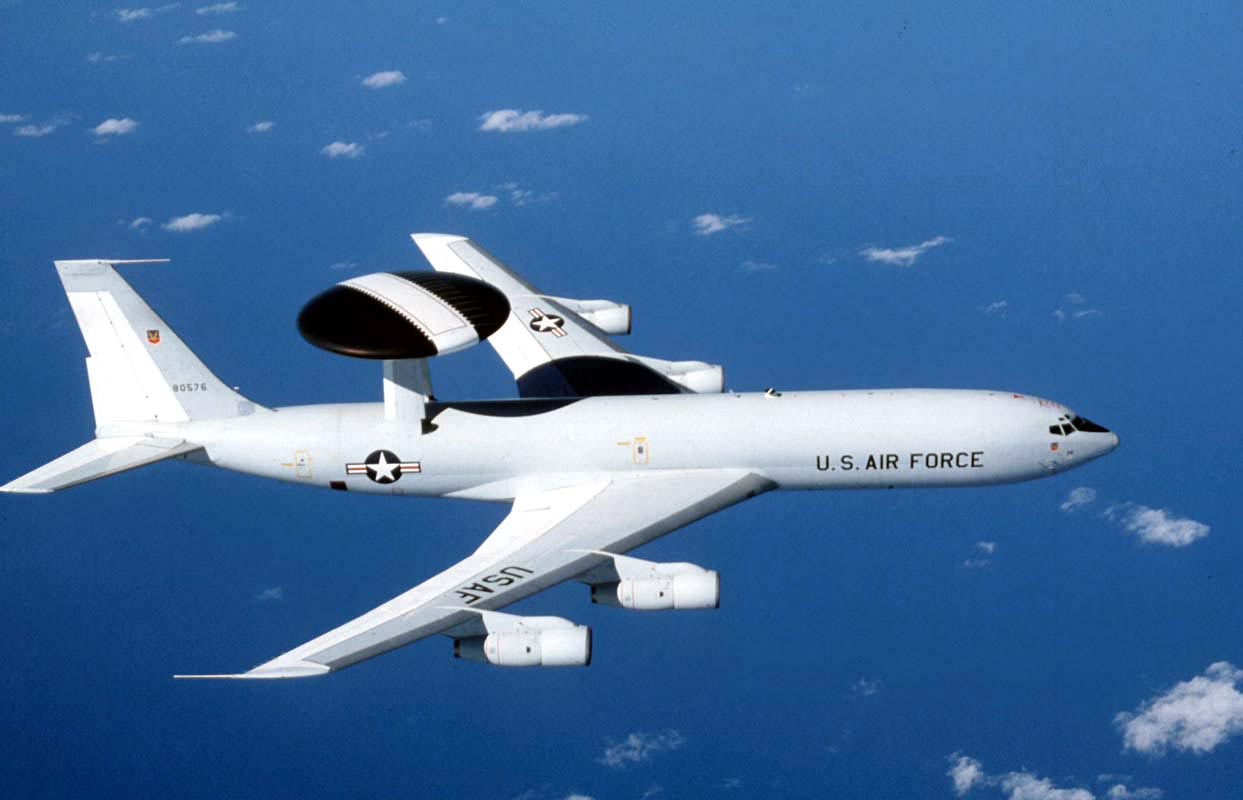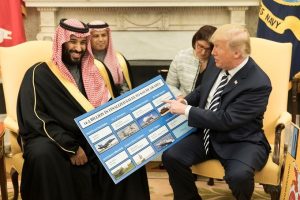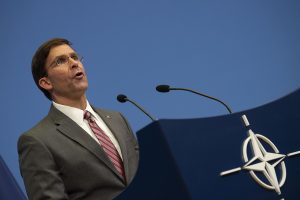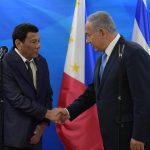by Eli Clifton
On Tuesday, The New York Times reported that Retired Admiral James Stavridis is on Hillary Clinton’s shortlist for a vice presidential candidate alongside Sen. Tim Kaine (D-VA). We’ve previously reported on Stavridis’s opposition to the Iran deal and his friendly relationship with anti-Muslim activist Frank Gaffney. But a review of his columns for ForeignPolicy.com (FP) reveal the retired admiral regularly promoting defense spending and weapons systems that could benefit defense contractors like Northrop Grumman, where Stavridis chairs the company’s international advisory board.
None of Stavridis’s columns on FP, or elsewhere, identifies his connection to the defense contractor. Instead, his FP bio describes him as “a retired four-star admiral and NATO supreme allied commander who serves today as the dean of the Fletcher School of Law and Diplomacy at Tufts University.”
Stavridis’s columns repeatedly urged NATO allies to increase their defense spending, which would almost assuredly benefit U.S. defense contractors like his employer. The U.S. leads the world in arms sales, accounting for $36.2 billion in arms transfer agreements out of a worldwide total of $71.8 billion in 2014, according to the Congressional Research Service.
“I have been writing for over three decades about the need for strong security for the United States, and have consistently advocated for a wide variety of systems,” Stavridis told LobeLog. “However, I have particularly advocated for soft power and smart power (the blend of hard and soft power).” Stavridis pointed to his TED Talk as providing context for how he approaches questions of global security.
He acknowledged being “one of (only two) members of the Northrop Grumman International Advisory Board, essentially a consulting assignment, for about a year” but clarified that the board “advise[s] the company on the foreign national security environment” and has “absolutely no executive authority within the company.”
Earlier this month, Stavridis opined that “With NATO members each agreeing to spend 2 percent of their national GDP on defense by 2020, the recent slide in European defense spending should be arrested and hopefully begin to rise.” In January, he warned that “Even during challenging economic times, the United States has to push its European allies to shoulder their share of NATO defense spending.” And in February 2014, ahead of French President François Hollande’s state visit to Washington, he advised that “Hollande should be strongly encouraged to avoid further [defense spending] cuts while commended for his global engagement.”
Stavridis also urged “lifting bans on weapons sales” to Vietnam last October. When the ban was lifted this May, despite concerns over Vietnam’s human rights record, Christopher Higgins, a defense analyst at Morningstar, told CNBC that “drone-makers like Northrop Grumman could end up profiting somewhat from the new arrangement.”
But Stavridis didn’t limit himself to promoting increased defense budgets and arms sales agreements that would benefit Northrop Grumman as well as other U.S. defense contractors. In multiple instances, he outright promoted weapons systems developed, manufactured, or serviced by Northrop Grumman.
Last November, Stavridis twice promoted AWACS aircraft “whose powerful radar provide 360-degree coverage of air battle space,” according to his description. Later that month, he published a column urging a closer alliance with Turkey, writing:
One level up, operationally, there is a need for a battle management system across the theater. This would ideally be an airborne radar and air control system which is found on the U.S. and NATO Airborne Early Warning and Control System (AWACS) E-3 aircraft. These large and capable planes can provide a look-down radar picture and provide de-confliction assistance. They could do so operating out of Turkish airbases and over Turkish airspace. If the coalition moves to set up a no-fly zone, they’ll be necessary.
If one clicks on the link provided by Stavridis about “airborne radar and air control system,” one learns that:
In November 2006, Northrop Grumman was awarded a $104.6m contract by the USAF to provide the large aircraft infrared countermeasures (LAIRCM) self-protection system for the Nato fleet of 17 E-3A AWACS.
And
The primary radar housed in the rotodome is the Northrop Grumman AN/APY-1/2 AWACS radar. The radar transmitters, computers and display stations are housed within the fuselage.
Stavridis also promoted missile defense systems, writing in January that:
We must also strengthen anti-ballistic missile defenses. This means preparing more of America’s high-end land- and sea-based anti-ballistic missile systems — notably the Terminal High Altitude Area Defense (THAAD) system for onshore defense and Aegis (Greek for “shield” and the air-defense-at-sea system). The United States should make both of these systems available to Japan and South Korea, America’s closest regional allies.
In 2010, Northrop Grumman was awarded a $577 million contract to develop the Integrated Air and Missile Defense Battle Command System (IBCS), a system which integrates various weapons systems, including the THAAD.
Stavridis told LobeLog:
I have at times advocated for defense spending broadly, and occasionally mentioned platforms like AWACS (made by Boeing, a competitor to Northrup-Gruman) or missile defense systems like THAAD and AEGIS (made by Lockheed Martin as prime contractor, another competitor to Northrup Truman). In every case that I can recall, it has been over programs NOT built by Northrop Grumman but rather by their main competitors. I always give my unvarnished views of what is best in the interest of the U.S. and our allies—without thought or reference to manufacturers. I will continue to do so, of course.
Foreign Policy Executive Editor Benjamin Pauker told LobeLog:
[N]o I was not aware of James Stavridis’s role as chair of the international advisory board of Northrup Grumman. That said, many of our writers have myriad affiliations that, frankly, would be too long to disclose in a short byline bio note. We do, of course, make all our writers and columnists aware that issues of disclosure are of paramount importance to FP’s implicit contract with our readers — it’s part of our ethics guidelines. To that end, while FP would theoretically publish an opinion piece on crude supply — say, from an advisor to the Saudi oil ministry — we would require that they make that affiliation known.
Were Stavridis to have written a paean to the F-35 Joint Strike Fighter, I’m sure he would have voluntarily disclosed his Northrup affiliation. That said, the pieces you cite reflect his long-standing opinions on issues of international security, formed years before he was a columnist for FP or a member of the advisory board of Northrup. And I think it’s a pretty thin argument that Stavridis is trying to win business for a defense contractor in his columns for FP.
Photo: AWACS aircraft






“I always give my unvarnished views of what is best in the interest of the U.S. and our allies….” Unfortunate that this ba*tard and his ilk don’t factor into their equations and machinations the effect that all the military spending has on common people who, on the lands on which they reside, inevitably suffer untold misery and scarring. We’ll never uplift the human condition, much less advance the cause of “civilization,” with the Stavridises among us around….
I suspect one would be hard pressed to find a single candidate for Defense Secretary without similar connections. Not that this is an excuse. Also of interest is his past role as a Rumsfeld toady (see Andrew Cockburn’s recent piece).
… of course he is being considered for VP, so that is even more concerning.
“I always give my unvarnished views of what is best in the interest of the U.S. and our allies—without thought or reference to manufacturers. I will continue to do so, of course.”
The good Admiral is saying, “trust me.” He knows that an ethical problem is possible.
The issue is conflict of interest. He can’t serve two masters when their interests conflict. In this case I suppose it would be the American people and Northrup Grumman, but it’s not quite that simple. The position in question is the Vice-Presidency. It has almost no constitutional duties, and those it does have are political, so the VP’s job description is not likely going to include whether or not to give Northrup a contract when it should go to Lockheed or Boeing. If in fact it does anyway, he will be required to declare the conflict to those concerned and see if they will waive it. If not he’ll recuse himself. It sort of looks like a tempest in a teapot.